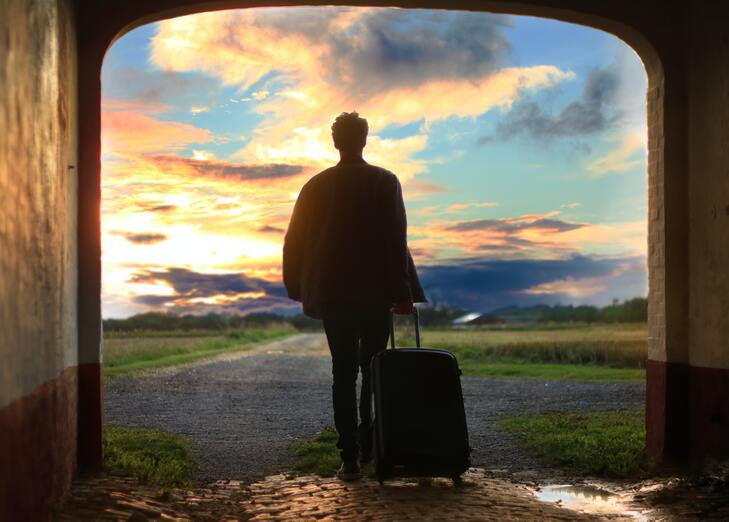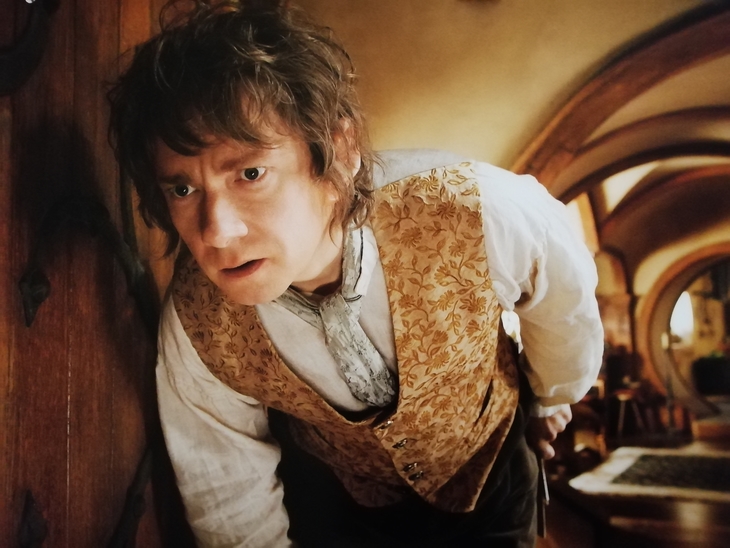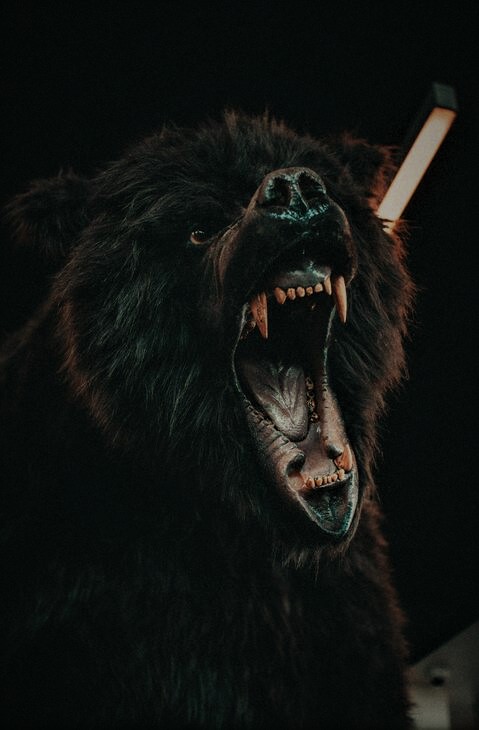There are no more Orcs left to fight, no more Azog to lead them. Those that have witnessed the three armies of Dwares, Elves and Men prevail, have fled to the holes dug for them by the Were-worms. The battlefield is silent, what remains is to come to terms with the losses that have occurred.
Legolas leaves
Legolas watches as Tauriel places Kili’s “return to me” runestone into his hand. She has fulfilled her promise and reunited with him, if only to see him die. Nevertheless, the love that they shared, no matter how fleeting, has left grief and sorrow on Tauriel. Legolas, seeing her emotions toward the Dwarf, turns to leave and finds his father on his way.
Legolas: “I cannot go back.”
Thranduil: “Where will you go?”
Legolas: “I do not know.”
Thranduil: “Go North. Find the Dúnedain. There’s a young Ranger amongst them. You should meet him. His father, Arathorn, was a good man. His son might grow to be a great one.”
Legolas: “What is his name?”
Thranduil: “He’s known in the Wild as Strider. His true name you must discover for yourself. Legolas. Your mother loved you. More than anyone. More than life.”
Having experienced the world outside the borders of Mirkwood, Legolas cannot think of going back to an enclosed kingdom, where time seems to stand still. There is nothing holding him there, having seen Tauriel, the Elf he cares for mourn over the death of her love. It is imperative for him to continue his journey and discover all of Middle-Earth for himself.
Evoking Aragorn
This scene is one that Philippa Boyens has written just to evoke the name of Aragorn that then ties directly into the Lord of the Rings trilogy. She wrote the scene out of pure geekdom, thinking that Peter Jackson would probably not film it. However, both Fran Walsh and Peter Jackson loved the transition she made in tying the two trilogies together and decided to film it.
What the scene also does is give the character of Thranduil an arc and a positive resolution to his relationship with his son, who he now needs to let go. It leaves us to guess that Thranduil has not talked about Legolas’ mother all that much, or at all since she died, having himself had the grief to deal with. And now before his son leaves for his own adventure, he wishes to impart the feelings that his mother had for him.
The fact that Thranduil wants his son to find Aragorn, is because he wishes his son to become a great man like Aragorn has the potential to become. It is Aragorn’s company that Thranduil wishes his son to partake in, feeling that it might bring onto a good and righteous path, one that might change the fortunes of the world.
Shared grief
Tauriel: “They want to bury him.”
Thranduil: “Yes.”
Tauriel: “If this is love, I do not want it. Take it from me. Please. Why does it hurt so much?”
Thranduil: “Because it was real.”
Tauriel cannot hold back her grief, and even though not that long ago Thranduil and Tauriel came into conflict with one another, grief that they both experience has brought them together. Thranduil cannot but feel the same way she does. It reminds him of his own grief that still permeates his life, grief that has dominated his rule of his kingdom as well as his relationship with his son.
In this situation of grief and loss, Thranduil is the ideal person to comfort Tauriel even though it might not have made any sense while the battle raged. He comforts Tauriel in the knowledge that what she felt for Kili was as real as what he has felt for his wife. He can see it now as she holds Kili’s hand.
Just because their love was not meant to be and from all sides would have been impractical, does not mean that it wasn’t real or that it did not bring as much love and joy with it as any other love would.
Kind Dáin
Gandalf: “The king is dead!”
Balin: “Long live the king!”
Everyone: “Long live the king!”
Bard with the rest of the people of Lake-town stands on the walls of Dale looking over at the walls of Erebor. Percy blows the horn of Dale in respect and remembrance of the King Under the mountain, Thorin Oakenshield. While the people of Lake-town pay their respects from the outside, inside the mountain, the Dwarves together with Gandalf, Radagast, Bilbo and Beorn mourn their king as well as his nephews Kili and Fili’s deaths.
Now that Erebor has been reclaimed for the Dwarves, a new king rises to the occasion to take over the kingdom, Dáin Ironfoot. With the army behind him, he adorns the crown that Thorin wore a day ago. He is now their king, one that will unite the Iron Hills with Erebor as well as the other kingdoms of Dwarves in Middle-Earth.
The legend of Thorin Oakenshield
Balin: “There is to be a great feast tonight. Songs will be sung. Tales will be told. And Thorin Oakenshield will pass into legend.”
Bilbo: “I know that’s how you must honor him. But to me, he was never that. He was.. To me…he was… “
To the Dwarves, Thorin will forever be their king, the leader they have followed ever since the battle of Azanulbizar. They will honor him in the proper way, the way in which a leader of the Dwarves should be honored. The legend that will encompass the name of Thorin Oakenshield will center around him as he was in the minds of the Dwarves, the qualities he had as a leader and the descendent of the House of Durin.
However, for Bilbo, Thorin will be something else, something that he is still not ready to uncover. The grief and the sorrow he feels does not let him express his mind, not yet anyway. It is still too painful to define what Thorin meant for him and how he will remember him.
Bilbo leaves
Bilbo: I’ll slip quietly away. Will you tell the others I said goodbye?”
Balin: “You can tell them yourself.”
Bilbo: “If any of you are ever passing Bag End, uh …tea is at 4. There’s plenty of it. You are welcome any time. Uh… Don’t bother knocking.”
The Dwarves stand at the entrance to Erebor wishing to say goodbye to their burglar. As it is they have grown very fond of him and are thus sad to see him go. That does not mean, however, that there will no longer be contact between them, or that the friendship has ended as the quest has.
The Dwarves will always be a part of him as he will be part of them. As such they have become friends rather than remained just comrades in a common goal.
With all his politeness, Bilbo invites the Dwarves to his Hobbit hole, essentially saying they needn’t bother with any pleasantries, that once were so important to him. That is just the first point of the transformation that has taken place within Bilbo. The others he will discover for himself once he returns to Bag End.
Follow me to my next post.
Featured image by Mantas Hesthaven on Unsplash





